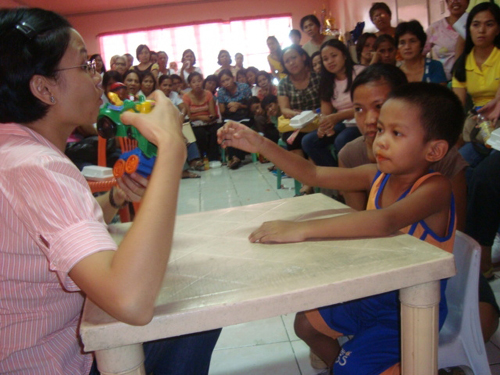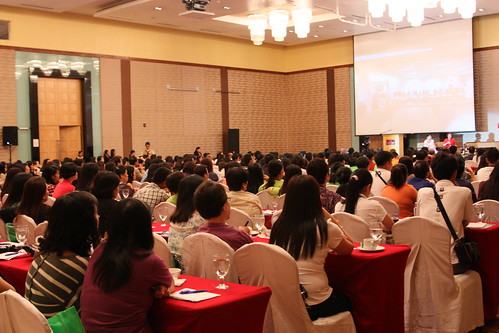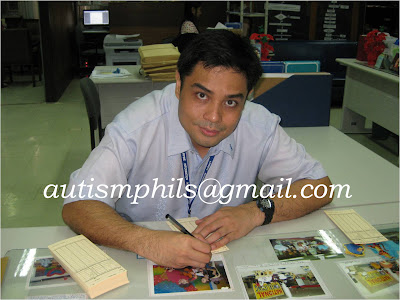By: Tiffany Tan, ASP Board Secretary
ASP representatives joined the Philippine Coalition on United Nations Convention of the Rights of Persons with Disabilities (UN CRPD) Training last July 14-16, 2011 at the Bayview Park Hotel, Manila. The Philippine Coalition on UNCRPD will be writing an alternative country report on the UNCRPD. Alex Cote, Capability Building Officer of International Disability Alliance facilitated the 3-day training.
 |
| Participants of the UNCRPD Training |
Below documents the Day 1 topics and speakers on Reasonable Accommodation and Progressive Realization
· Experiences with Physical Accessibility on BP 344 or the Accessibility Law by Architect Jaime Silva, UAP
· Experiences in Special Education by Dr. Therese Bustos, UP College of Education
· Critiquing of the Proposed National Human Rights Action plan by Atty. Ray Paolo Santiago, Ateneo Human Rights Center
· Data Gathering on Human Rights Violations by Dr. Renante A. Basas, Commission on Human Rights
· Alternative Budgets as tools for Social Development by Prof. Alvic Padilla, Social Watch Philippines
· Lessons and Challenges in the Preparation of the CESCR Parallel Report by Dr. Hymia Pimentel-Simbulan, PhilRights
· A Plan for a Systematic Review of Existing Legislation in the Context of the CRPD Principles by Atty. Rosirio Olivas-Gallo, Vice Dean, College of Law De La Salle University
During the group activities in between the talks, Persons with Disabilities (PWD) some of their grievances on the violations against PWD on the following (1) Omnibus Election Code on the en banc resolution on assistance to PWD voters, but how to harmonize them with the CRPD, (2) BP 344 have no specific terms/parameters set for transportation (e.g. provision/accommodation for wheel-chair bound passengers in buses) citing cases on PWDs having to pay for high cost of taxi fare instead of taking affordable public transportation systems with limited PWD access, (3) PWDs right to education, but unfortunately, not all public schools can give “quality” education to PWDs.
Cote clarified to the group the meaning of
“reasonable accommodation” as affecting one person in one particular situation, addressing his individual needs within the available resources, here and now. This is linked to the individual discrimination, and does not involve a “systemic change”. Cote said the question to ask is
“What is best for the individual?”
 |
| Mr. Alex Cote with Mr. Lauro Purcil |
Returning to the Article 2 of the CRPD, we find the definition of “reasonable accommodation,”
necessary and
appropriate modification and
adjustments not imposing a disproportionate or undue burden, where needed in a particular case, to ensure to persons with disabilities the
enjoyment or exercise on an equal basis with others of all human rights and fundamental freedoms.
Progressive realization is the member state’s obligation in
realizing the
PWD rights fully. It gives developing countries, like the Philippines, some flexibility in achieving the objectives of the Convention, it does not absolve States parties of the responsibility to protect those rights. Unlike economic, social and cultural rights, civil and political rights are not subject to progressive realization. In other words, States must protect and promote these rights immediately.
The day ended with another reminder by one of the speakers to build networks to strengthen issues of PWD. As rights bearers, we ought to
ENGAGE duty bearers to hear our plight, with
VIGILANCE.
The activity is sponsored International Disability Alliance, (IDA) The Katipunan ng May Kapansanan sa Pilipinas, Inc. (KAMPI), Australian Agency for International Development (AUSAID) and the Christian Blind Mission (CBM) and Physicians for Peace.
Be an Angel for Autism. Donate generously to ASP Programs and Services. Donate to Autism Society Philippines Metrobank Kamias Branch 047-3-04751874-2. Email us at autismphils@gmail.com or call 7-903-5496.


















